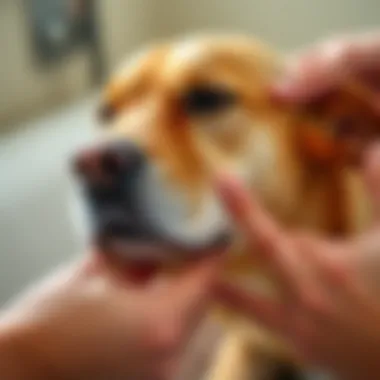Effective Approaches for Managing Dogs' Severe Itching


Intro
Severe itching in dogs can be a perplexing and distressing issue for both the pet and the owner. Many dog owners find themselves puzzled when their beloved creature is scratching away incessantly. Itchy skin often hints at underlying problems that may be more serious than they initially appear. Hence, understanding the various factors contributing to this condition is pivotal in finding effective solutions. This article serves as a comprehensive guide, diving into the root causes of itching, how to pinpoint the exact problem, and what treatment options are available. By unpacking the layers of this condition, we aim to arm pet parents with the insights needed to tackle their canine's discomfort, ultimately improving their pets' quality of life.
Pet Care Essentials
Caring for a dog’s skin and coat is more than just aesthetics; it’s about overall health and comfort. Several aspects of daily care play significant roles in preventing and managing itching. Paying attention to a few essentials ensures your dog feels their best.
Daily Nutrition Requirements
A well-balanced diet is the foundation for maintaining a dog's health, which directly impacts skin condition. Darin from the local pet nutrition shop often reminds pet owners: "You are what you eat, and so is your dog." Dogs require a blend of essential nutrients, including high-quality proteins, Omega fatty acids, vitamins, and minerals. Foods rich in Omega-3 and Omega-6 fatty acids, like salmon or flaxseed oil, can improve skin hydration and prevent itching.
- Tip: Consulting with a veterinarian can lead to the selection of the best dietary options specific to your dog’s needs.
Exercise and Playtime
Physical activity is not just fun, but it’s crucial for keeping the immune system robust, which can, in turn, help keep skin irritations at bay. Engaging in daily exercise, whether it’s a brisk walk or a game of fetch, contributes not only to your dog’s physical health but also mental well-being. Ali, a passionate dog trainer, emphasizes how stimulating a dog's mind can reduce stress that might lead to excessive scratching.
- Recommendation: Aim for at least 30-60 minutes of active play each day, tailored to your dog’s breed and age.
Grooming Tips
Regular grooming does wonders for a dog's skin and coat. Washing away dirt, dander, and parasites like fleas can alleviate itching significantly. It’s worthwhile to note that different breeds have unique grooming needs.
- Use a soothing shampoo designed for sensitive skin, perhaps with oatmeal or aloe.
- Brushing helps distribute natural oils, improving coat health.
Health and Wellness Check-ins
Routine veterinary visits are essential for monitoring your dog's health status. Make it a habit to schedule check-ups every six months. These visits can help detect allergies, skin infections, or underlying conditions that could be the culprits behind the scratching.
"Preventative care is the first line of defense against many serious health issues, including skin problems." – Dr. Thompson, Veterinarian.
In discussing the various aspects of effective pet care, owners should understand that the journey to addressing severe itching is often multifaceted. By prioritizing nutrition, exercise, grooming, and regular veterinary visits, owners can establish a solid foundation for their dog's skin health. Next, we will discuss how to decipher the behavioral aspects contributing to itching.
Foreword to Severe Itching in Dogs
Dealing with a dog that is constantly scratching or biting at its skin can be disturbing for both the pet and the owner. Itching isn't merely a nuisance; it may indicate deeper health issues that demand attention. In this section, we explore the significance of understanding severe itching in dogs and why addressing it is crucial for the overall health and happiness of your canine companion.
When a dog experiences severe itchiness, it often leads to not only physical discomfort but also emotional distress. Dogs, like humans, can suffer from anxiety and irritability due to constant itching. This can disrupt their daily activities, such as playing or resting, which is vital for their well-being. Thus, recognizing and treating the underlying causes of severe itching is essential.
Understanding that itchiness in dogs can arise from a variety of sources, including allergies or parasites, sets the stage for effective treatment. Knowing this gives owners the right mindset to seek solutions rather than merely attempting to soothe symptoms. Moreover, this knowledge empowers pet owners to make informed choices about their dog's care, benefiting both their health and quality of life.
Another critical aspect is the complex relationship between physical symptoms and behavioral changes. A dog that itches incessantly may become withdrawn or aggressive. Identifying the cause of itching not only addresses the physical discomfort but also can help restore a dog’s emotional stability. This holistic approach to health underscores the importance of exploring this topic thoroughly.
From a veterinary perspective, early detection of itch-related issues can prevent more serious conditions from developing. Skin infections, for instance, can arise if a dog continues to scratch open their skin. Therefore, timely intervention can save both suffering and expenses down the line.
Understanding Dog Itchiness
Understanding dog itchiness is crucial for pet parents who are dealing with the distressing reality that their furry friends are suffering. Itchiness often signals a deeper issue, and recognizing its significance can steer you toward effective solutions that enhance your dog’s quality of life. A dog's skin itches for various reasons, and understanding why helps build a fair game plan for treatment.
Importance of Identifying the Cause
Identifying the root cause of itchiness is like peeling back the layers of an onion. Each layer uncovers vital information that can lead to a comprehensive and effective treatment plan. When it comes to your dog’s skin, merely addressing the symptom—like the itching—without understanding the underlying cause risks missing out on a solution that addresses the true problem.
There are numerous reasons dogs may itch: allergies, parasites, infections, or underlying health conditions, each requiring a different approach. For example:
- Environmental Allergies: Pollen, dust, and mold can wreak havoc on a dog’s skin. If the cause is environmental, solutions may include regular cleaning or switching up their walking routes.
- Dietary Allergies: Food ingredients can often lead to itchy skin. By identifying specific items your dog may be allergic to, you can tailor their diet accordingly, promoting healthier skin and overall happiness.
- Parasites: Fleas and ticks are unwelcome guests that bring with them dermatitis and infections. In such cases, addressing the parasites directly often alleviates the itching effectively.
Understanding the cause not only facilitates effective treatment but also aids in prevention. Once you know what triggers your pet’s discomfort, you can implement strategies to minimize exposure and reduce recurrence:
- Creating Allergen-Free Zones: Identifying high-allergen areas and minimizing exposure can greatly benefit your dog’s comfort.
- Regular Grooming: This helps in keeping the skin clean and checked for signs of parasites or other issues early.
- Consultation and Follow-up: Open dialogue with your veterinarian can unveil previously unnoticed patterns and potential triggers.
Effective intervention requires a precise understanding of the problem. Without accurate identification of the cause of itchiness, treatment may become a game of trial and error—frustrating for both you and your pet.
In summary, understanding why a dog itches isn't just an academic exercise; it’s a fundamental part of ensuring their comfort and well-being. Armed with this knowledge, pet owners are better equipped to decide on comprehensive treatment approaches, leading to healthier, happier lives for their beloved companions.
Common Causes of Severe Itching
Understanding the common causes of severe itching in dogs is essential for anyone caring for a pet. That’s because pinpointing the root of the discomfort not only aids in choosing the right treatment but also improves the overall quality of life for the animal. Each cause is different and might need a unique approach. Owners who understand these causes can act faster, ensuring their dogs get the relief they need without unnecessary delays. Some may think that scratching is merely a nuisance or a behavioral quirk, but often it’s a sign that something deeper is at play.
Allergies: Environmental and Dietary Factors
Allergies, whether environmental or dietary, are one of the major culprits behind severe itching in dogs. An environmental allergy could come from pollen, dust mites, or even molds lurking in your house. Dogs react differently; some might show an itchy nose or ears, while others could be pawing frantically at their skin.
On the other hand, dietary allergies are sneaky. Many dogs can be sensitive to certain food ingredients, like beef or wheat. When they consume something their bodies don’t agree with, it's as if they’ve hit a nerve, leading to intense discomfort and scratching.
"Identifying the exact allergen can sometimes feel like searching for a needle in a haystack, but the payoff is worth the chase."


Parasites and Their Impact
Parasites can cause serious itching in dogs, with fleas and ticks being the usual suspects. A single flea can trigger an allergic reaction, making the dog itch like there’s no tomorrow. If you think about it, it's an ongoing battle; while the dog tries to scratch away the discomfort, the parasite is busy having a feast.
Other parasites, like mites and worms, can also bring about itching while leading to other health issues. Health care professionals recommend regular pest prevention treatments, and it’s wise to keep a close eye on your dog when they have been exposed to areas where these parasites tend to lurk, like tall grass or woods.
Skin Infections: Bacterial and Fungal
Bacterial and fungal skin infections are often secondary problems that emerge from the scratching itself or weaknesses in the skin barrier. When a dog scratches excessively, it can break the skin and give bacteria a prime opportunity to invade. That scratching is like shouting, "Come on in!" to the germs. Fungal infections, such as ringworm, can lead to patches of itchy skin that might be hard to miss if you’re paying attention.
These infections can fester and become quite serious if left untreated, making it imperative for owners to address them early. A quick trip to the vet can often clear things up before they escalate.
Underlying Health Conditions: Hormonal Imbalances
Sometimes, itching might stem from underlying health issues like hormonal imbalances. Conditions like hypothyroidism or Cushing's disease can lead to changes in the skin, decreasing its ability to ward off irritants effectively. Skin becomes thinner, sensitivity ramps up, and the itch-scratch cycle begins.
Pet owners should certainly be on the lookout for other symptoms if they suspect a hormonal imbalance, such as weight changes or alteration in energy levels. Consulting with a veterinarian can clarify whether hormonal issues are causing the severe itching and what can be done about it.
Recognizing Symptoms Accompanying Itching
Identifying the symptoms that accompany itching in dogs is crucial for pet owners. It provides insight into what the dog may be experiencing beyond just the discomfort of itchy skin. Recognizing these signs can help you distinguish between minor irritations and serious medical conditions. An informed owner can manage their dog’s health more effectively, potentially catching issues early before they escalate into something chronic. Moreover, being attuned to your dog’s behavior and physical condition allows for tailored interventions, optimizing treatment outcomes.
Behavioral Changes in Affected Dogs
Behavioral changes can act as the first warning bell when it comes to a dog's itchy skin. When a dog is uncomfortable, their temperament can shift. You might see your furry friend scratching more than usual, but that’s often just the tip of the iceberg. Pay attention to the following behaviors:
- Increased Irritability: It’s easy to overlook how discomfort affects your dog's mood. An itchy dog may become more irritable or even aggressive, especially if you touch areas they're sensitive about.
- Withdrawal: If your dog was once a social butterfly, but now prefers to hide away or avoid interaction, it could indicate that they’re unhappy due to their skin condition.
- Restlessness: Look out for signs where your dog is unable to settle down, seemingly agitated. Pacing, excessive licking, or trying to scratch in specific areas are clear indicators of discomfort.
- Changes in Eating and Drinking Habits: Sometimes, the stress from itching can affect appetite. If you notice a drop in your dog’s food or water intake, it could tie back to their discomfort.
Noticing these behaviors can help you to alert your veterinarian about the correlation between the itching and changes in their normal attitude, assisting in diagnosing the problem. When discussing these observations, it might help both you and the veterinarian get to the root of your dog's issues more quickly.
Physical Signs to Observe
In addition to behavioral changes, certain physical signs can also indicate itchy skin. Dogs can't verbally express their discomfort, but their bodies can. Spotting these symptoms may give you important clues into what could be aggravating your dog's condition:
- Red or Inflamed Skin: Look for patches of red skin or areas that seem tender. This could be a sign of an allergic reaction or infestation.
- Hair Loss: Persistent itching often leads to hair loss in patches or overall thinning of the coat. This can be quite distressing for both the dog and the owner, as it alters the beauty of their furry companion.
- Skin Lesions: Crusty or open sores are key signs of secondary infections caused by excessive scratching. It’s essential to handle these as soon as possible to prevent further complications.
- Odor: An unpleasant smell emanating from your dog can indicate bacterial or yeast infections that have developed due to irritation and biting or licking at the skin.
"Early detection of symptoms can often lead to better outcomes and treatment options for both you and your pet."
In summary, recognizing behavioral and physical signs linked to itching can guide you in effectively managing your dog's well-being. By staying vigilant and responsive, you can help ensure that your dog receives the care it needs, fostering a healthier and more comfortable life.
Seeking Professional Veterinary Help
When faced with the troubling issue of severe itching in dogs, seeking professional veterinary help is not just advisable; it’s essential. This is because the world of veterinary medicine is vast, encompassing a multitude of specializations that can pinpoint the underlying causes of itching your furry friend might be experiencing. By reaching out to a vet, you not only get expert insight into potential allergies, infections, or skin conditions but also a structured approach to treatment that is tailored specifically for your dog's needs.
The benefits of involving a veterinarian are multifaceted. For one, they possess the knowledge and experience necessary to differentiate between the simple irritation of bug bites and more complex underlying issues like allergies or even autoimmune disorders. A proper diagnosis can save you from the endless cycle of trial-and-error treatments that may only mask symptoms instead of addressing root causes.
Additionally, early intervention often leads to more effective treatment outcomes. Delaying a trip to the vet can lead to exacerbated conditions that may become harder to manage over time. Therefore, it's prudent to be proactive about your dog's health and consult a professional whenever you're uncertain about their symptoms.
When to Schedule an Appointment
Recognizing the right moment to call the vet can feel overwhelming for many dog owners, especially when symptoms like excessive scratching or biting arise. Here are some indicators that should trigger a prompt visit:
- Persistent Itching: If your dog is scratching, licking, or biting at their skin more than usual.
- Inflammation or Redness: Noticeable swelling, redness, or hot spots indicating inflammation should be addressed immediately.
- Skin Lesions: The appearance of sores, bald patches, or any changes in your dog's skin texture is a signal that something is not right.
- Behavioral Changes: Changes in your dog's mood or behavior, like increased aggression or withdrawal, could indicate discomfort.
- Secondary Symptoms: Such as vomiting or diarrhea, often accompany itching but may point to more serious conditions that require immediate attention.
In a nutshell, if you notice any combination of these symptoms persisting for more than a couple of days, it would be wise to reach for the phone and book an appointment.
Potential Diagnostic Tests Conducted
Upon visiting the vet, you may wonder about the types of diagnostic tests they might conduct to unravel the mystery of your dog's itching. The following procedures are often employed to help diagnose the underlying issues:
- Skin Scraping: This test allows vets to check for parasites, such as mites or fleas, that could be causing irritation.
- Allergy Testing: While some allergens are obvious, others may require either skin tests or blood tests to determine the specific triggers for your dog’s itch.
- Cytology: A sampling of skin or ear discharge can reveal any bacterial or yeast infections that might be causing discomfort.
- Biopsy: In more severe cases, a small piece of skin may be surgically removed to assess for serious skin conditions or tumors.
- Blood Tests: Overall health can be evaluated through blood tests to check for underlying health issues that could contribute to skin problems.
Each of these tests plays a critical role in narrowing down the options and identifying what your dog is dealing with specifically. By arming yourself with this knowledge, you can proceed more effectively into treatment and make informed decisions that will lead to a happier, more comfortable life for your pup.
"Taking your dog for a vet visit is like casting a wide net; you never know what you might catch, but each discovery can lead you closer to understanding your dog's health."
Understanding the need for professional help and potential diagnostic tests isn't just about following protocol; it's about giving your dog the best chance at a quick recovery.
Comprehensive Treatment Approaches
When a dog experiences severe itching, it can derail not just their health but also the peace of mind for pet owners. Understanding comprehensive treatment approaches is crucial as it allows for an informed response to this distressing issue. Each dog is unique, and the treatment strategies should be personalized based on various factors, including the underlying cause of the itching, the dog's age, breed, and overall health. Putting together a multifaceted treatment plan can help restore comfort for your furry friend and tackle the itch at its source.
The benefits of taking a comprehensive approach are numerous. For starters, it can lead to quicker relief from symptoms and reduce the risk of secondary health issues like infections that often arise from constant scratching. Moreover, including different treatment elements, such as topical therapies, medications, and lifestyle adjustments, can nurture your dog's skin health holistically. This integrative perspective not only addresses the symptoms but also promotes long-term wellness.
A well-rounded treatment plan usually encompasses different methods tailored to your dog’s specific needs. However, remember that it's always best to work in tandem with a veterinarian who can provide guidance on the most effective measures, mitigating any potential risks associated with treatments.
Topical Treatments and Their Efficacy


Topical treatments can offer immediate relief for dogs suffering from itching. These can include medicated shampoos, creams, and sprays designed to soothe inflamed skin. Products that contain ingredients like colloidal oatmeal, aloe vera, and hydrocortisone are commonly recommended. These ingredients not only help to alleviate itching but also moisturize the skin, promoting healing.
- Medicated Shampoos: Shampoos with antimicrobial properties can reduce bacteria and fungi that contribute to skin irritation. They can also aid in removing allergens from the fur and skin.
- Creams and Sprays: Topicals that contain anti-itch ingredients can be applied directly to the affected areas. This localized application allows for higher concentrations of active ingredients, targeting the specific spots where your dog feels discomfort.
While these treatments can be effective, they often need to be part of a broader plan. It's critical to monitor the dog’s response by observing whether the itching subsides or if any adverse reactions occur, and adjust accordingly under veterinary advice.
Oral Medications: Corticosteroids and Antihistamines
Oral medications are another vital piece of the puzzle for managing itchiness in dogs. Corticosteroids work by reducing inflammation and suppressing the immune response that contributes to allergic reactions. Even though they can be highly effective in relieving itching, long-term use needs to be carefully managed, as they come with potential side effects like increased thirst and appetite, and risk of infections.
Antihistamines, on the other hand, are often used to treat allergic reactions. While they might not be as powerful as corticosteroids, they tend to have fewer side effects. It's worth noting that the efficacy of antihistamines can vary, so sometimes, it may take a bit of trial and error to find the right fit for your pet.
- Safety First: Never administer any medications without vet approval. Some dogs may have underlying health conditions or may be on other medications that can interact unfavorably.
- Dosage Matters: Follow the vet’s recommendations closely when it comes to dosage and frequency to avoid complications.
Immunotherapy: Long-term Solutions
Immunotherapy, often regarded as a long-term solution for managing severe itchiness due to allergies, works by gradually desensitizing the dog's immune system. This is particularly beneficial for dogs that have identified allergens such as dust mites, pollen, or certain foods.
This treatment typically involves two phases:
- Initial Phase: Your veterinarian will determine the specific allergens through blood tests or skin testing and then create a tailored vaccination plan, which is administered through injections. This phase can take several months.
- Maintenance Phase: Once your dog is stabilized, the frequency of vaccinations may be reduced, allowing for enduring immune tolerance against the allergens.
- Commitment Required: Immunotherapy is not immediate; it can take time—sometimes six months or longer—to see significant improvements. However, its benefit lies in its potential to provide long-lasting relief, allowing your dog to thrive without reliance on medications.
Home Remedies and Natural Alternatives
The pursuit of comfort for our furry friends often leads us down the path of home remedies and natural alternatives. While veterinary care is irreplaceable in many circumstances, exploring remedies that originate from the home pantry or garden can also yield some benefits. Such approaches not only provide another layer of care, but they may also enhance the overall well-being of dogs suffering from severe itching.
Home remedies can be particularly appealing for pet owners seeking gentler methods or those looking to complement their veterinary treatments. However, it is important to approach these alternatives with an informed mindset. Not every remedy is suited for every dog; individual responses may vary based on breed, age, and existing health conditions. Therefore, a thoughtful evaluation is necessary when considering these options.
For many owners, these remedies may resonate due to several key benefits:
- Cost-Effectiveness: Homemade solutions are often budget-friendly compared to prescription treatments.
- Fewer Chemicals: Natural ingredients often lack synthetic components, which can be gentler on a dog’s system.
- Customizability: Pet owners can tailor these remedies to their dog's specific needs, factoring in any allergies or intolerances.
Yet, caution must be exercised. Some substances that seem innocent can actually be harmful. Always conduct thorough research or consult with a veterinarian before adding anything new to your dog’s routine. Keeping a watchful eye on any new reactions is essential; if itching worsens or if additional symptoms arise, it's crucial to revert to traditional veterinary guidance.
Implementing Dietary Changes
Adjusting your dog's diet can play a pivotal role in alleviating itchy skin. Food can be both a cause and a solution. When it comes to dietary changes, owners can take several steps to help minimize the likelihood of itchy reactions. Here are a few strategies to consider:
- Identify Potential Food Allergies: Proteins such as beef, chicken, and dairy are common allergens. Many dogs may benefit from a limited ingredient diet that reduces exposure to these triggers.
- Incorporate Omega Fatty Acids: Supplements containing omega-3 and omega-6 fatty acids can improve skin condition by bolstering the skin’s barrier and reducing inflammation. Fish oil is a popular choice.
- Add Probiotics: These beneficial bacteria aid in digestion and support overall gut health, which may improve the skin's response to allergens.
- Ensure Balanced Nutrition: A nutrient-rich diet ensures your dog has all the vitamins and minerals needed for a healthy coat and skin. Consider ingredients high in antioxidants and vitamins that promote skin health.
When changing diets, it's wise to transition gradually. A sudden switch can upset your dog’s stomach, potentially leading to more itchy problems rather than fewer.
Herbal Treatments: Efficacy and Safety
Herbal treatments have gained popularity for various health conditions, including skin issues in dogs. Many herbs have properties that can soothe skin irritation or combat inflammation. However, these herbal options require cautious use.
- Aloe Vera: Known for its healing properties, aloe vera can soothe and hydrate irritated skin. Apply a small amount of pure gel to the affected area; however, ensure your dog does not lick it off as it can cause stomach upset.
- Chamomile: This herb can be infused into a rinse or bath to calm itchy skin. Make sure it is cooled down before application.
- Calendula: Known for its anti-inflammatory and antiseptic properties, calendula can be applied topically to aid healing.
It’s essential to conduct thorough research on any herb you consider, noting that not all plants are safe for dogs. Always consult with a veterinarian familiar with herbal treatment before proceeding. Despite the allure of natural options, a dog’s safety should always reign supreme.
Prevention Strategies for Future Itching
Prevention in the realm of canine care is always more effective than a cure, especially when it comes to combating severe itching. Understanding the significance of preventive measures is crucial for dog owners who wish to maintain their pet's comfort and quality of life. Not only does proactive care reduce incidents of skin irritations, but it also fosters an overall environment where your dog can thrive. Implementing these strategies can mean the difference between a happy, itch-free dog and one that struggles with chronic discomfort.
Environmental Adjustments to Reduce Allergens
Taking a closer look at your dog's environment can reveal a treasure trove of potential allergens. Common allergens might lurk in your home, from dust mites and mold to pollen and cigarette smoke. Here are a few vital adjustments to consider:
- Regular Cleaning: Frequent vacuuming and washing of bedding will help minimize dander and dust particles. Using HEPA filters can capture even the tiniest of allergens.
- Humidity Control: Dogs can be sensitive to high humidity levels. Using a dehumidifier can help reduce mold growth in damp areas, like basements.
- Outdoor Considerations: Pollen can be a culprit during certain seasons. If your dog is prone to allergies, limit their outdoor time during high pollen counts, especially in spring.
- Barrier Methods: Investing in hypoallergenic dog beds, washable covers, and even designated areas in your home for your dog can limit their exposure to potential irritants.
Methodically tweaking your dog’s environment to limit allergen exposure cultivates healthier skin and can prevent itching before it even starts.
Routine Health Maintenance Practices
Routine health maintenance is the backbone of effective itch prevention. Regular vet check-ups play a crucial role in identifying and addressing potential issues before they manifest dramatically. Here are key practices that every responsible dog owner should incorporate:
- Regular Grooming: Maintaining a consistent grooming schedule helps keep your dog’s coat clean and free from irritants. Brush your dog thoroughly, as this helps remove trapped dirt, dead hair, and pests.
- Skin Checks: Make it a habit to inspect your dog’s skin regularly. Look for any signs of irritation, redness, or unusual growths. Early detection often leads to early intervention.
- Vaccinations and Preventatives: Keeping your dog’s vaccinations up-to-date and using preventatives against fleas and ticks can significantly reduce the chance of skin problems.
- Nutritional Balance: A well-rounded diet tailored to your dog’s specific needs can fortify their skin. Consulting with a veterinarian about the right supplements can also bolster the health of your dog's coat.
"An ounce of prevention is worth a pound of cure." Simply put, being proactive can, and often does, save you from many heartaches along the way. Investing time into prevention strategies today may pay dividends in the long run, ensuring your furry friend leads a healthier, itch-free life.
Understanding the Role of Nutrition
In addressing severe itching in dogs, the significance of nutrition cannot be overstated. A balanced diet not only supports overall health but also plays a pivotal role in managing skin conditions. The food that a dog consumes can directly impact the condition of its skin and coat. Nutritional deficiencies or the wrong diet can exacerbate itching, leading to a cycle of discomfort and distress.
Selecting the Right Food for Sensitive Skin


When it comes to a dog with itchy skin, it is crucial to choose the right food. Many dogs are sensitive to certain ingredients often found in commercial dog food, such as grains, artificial additives, or common proteins like beef and chicken. Hence, selecting a high-quality diet with limited ingredients can make a noticeable difference.
1. Consider Novel Protein Sources
Look for foods that contain novel protein sources that your dog has not been exposed to before, such as:
- Duck
- Lamb
- Fish (like salmon or herring)
2. Grain-Free Options
Grains can be allergens for some dogs, leading to itching. A grain-free diet may alleviate symptoms for sensitive dogs.
- Use potato or pea as a carbohydrate source.
- Look for high-quality carbohydrates like sweet potatoes or pumpkin.
3. Omega Fatty Acids
Dietary omega-3 and omega-6 fatty acids are game-changers for dogs with itchy skin. They help to improve skin health and coat condition, reducing inflammation and itchiness. Consider foods rich in these essential fatty acids or supplements such as fish oil or flaxseed oil.
"The right food can act as a natural anti-inflammatory, soothing the skin from within."
Supplemental Strategies to Enhance Diet
Even with the best dog foods, adding supplements can further enhance the diet. These additional nutrients can fill gaps and bolster your dog's defenses against itching.
1. Probiotics
Keeping your dog’s gut healthy is essential for overall well-being. Probiotics can improve digestion and bolster the immune system, ultimately aiding in skin health.
2. Vitamins and Minerals
Ensure that your dog gets a balanced array of vitamins and minerals. Zinc and vitamin E are particularly beneficial for skin health. Consider a multivitamin tailored for dogs.
3. Hydration
Don’t overlook the importance of water. Dehydration can lead to dry skin, making itching worse. Make sure your dog has constant access to fresh water.
In sum, understanding your dog's nutritional needs is a vital step in managing severe itching. By carefully selecting the right food and considering additional supplements, dog owners can lay the groundwork for their pet's skin health. This proactive approach can mean the difference between a dog living in comfort versus one plagued by incessant itching.
Monitoring and Adjusting Treatment Plans
Careful observation of your dog’s condition and response to treatment forms the backbone of effective management for severe itching. This ongoing process isn't just about keeping track; it's about adapting strategies to ensure optimal comfort and health for your pet. The dance between cause and effect can sometimes feel elusive, especially when multiple elements interplay in your dog's skin health. However, the benefits of rigorous monitoring can largely outweigh the initial hurdles.
Tracking Your Dog’s Response to Treatments
Implementing a clear method to monitor your dog’s reaction to implemented treatments is vital. Each dog is unique and may respond differently to various medications or therapies. Here’s how you can track your dog's response:
- Maintain a Journal: Regularly note down the type of treatment, dosage, and any noticeable changes in your dog's behavior or condition. Mark observations like scratching frequency or skin condition.
- Observe for Side Effects: Be vigilant for adverse reactions to medications, including increased itching, lethargy, or changes in appetite.
- Timing is Crucial: Provide ample time for treatments to take effect before making decisions; some may take weeks to show results.
Maintaining detailed records not only aids in understanding your dog's individual needs but also provides your vet with invaluable information for adjustments. Consistent data allows for more precise evaluation during appointments.
Communicating with Your Veterinarian Effectively
A well-functioning partnership with your veterinarian can make all the difference. Good communication isn't merely about stating facts; it involves a dialogue that can clarify your dog’s condition and enhance treatment efficacy.
- Be Prepared with Information: Bring your journal of observations to the vet's appointment. The more data you present, the better your vet can understand your dog’s situation.
- Ask Questions: Don’t shy away from asking about any uncertainties regarding treatments, potential side effects, or alternative approaches. Knowledge is power.
- Share Your Concerns: If you feel a treatment isn’t working or if side effects are troubling, express your concerns openly. Your veterinarian may need to adjust dosages or prescribe something different based on your feedback.
"Effective treatment hinges not just on the cure but on the understanding between pet owner and veterinarian."
Together, these strategies form a foundational component in addressing and adjusting treatment plans. As you become adept at monitoring and communicating effectively, you'll likely find yourself more empowered and informed in tackling your dog's severe itching.
The Emotional Impact of Itchy Skin
Severe itching in dogs doesn't just affect their physical health; it also takes a toll on their emotional well-being. Just like us, dogs can experience stress and anxiety in response to discomfort. By acknowledging the emotional side of this condition, pet owners can take more effective steps to alleviate their furry friends’ misery. After all, a happy dog is a healthy dog, and it’s crucial to understand that managing itchiness is about more than just finding solutions for physical symptoms.
Understanding Your Dog’s Stress and Anxiety
When a dog is constantly scratching, biting, or licking at its skin, it becomes more than just a bothersome habit. It’s a sign of distress. This behavior can often escalate into anxiety, as your dog may not know why it’s feeling uncomfortable or how to alleviate the situation.
- Symptoms of Stress: Look for signs such as pacing, whining, or excessive grooming. These may indicate your dog is feeling overwhelmed. A dog’s body language often speaks volumes; a tail tucked between the legs or ears pinned back can reveal more than just discomfort.
- Relationship with Environment: Stress can intensify based on the dog's surroundings. If a dog is allergic to pollen but lives near a park, the constant exposure can spiral into anxiety and frantic scratching. Awareness of environmental triggers can help pet owners create a more soothing atmosphere for their dogs.
- Useful Strategies: To address your dog’s anxiety, consider employing calming techniques. Natural remedies like lavender oil can work wonders; just make sure it's pet-safe. Additionally, regular exercise can reduce stress levels significantly. A tired pooch is usually a happy pooch! As well, engaging activities can keep your dog’s mind occupied, thus reducing the focus on the itch.
Building a Calm Environment for Recovery
Creating a serene environment is a vital step in aiding your dog’s recovery from the emotional strains of itchiness. Just as humans find refuge in a calm setting during stress, dogs also thrive in environments that promote comfort and peace.
- Comfortable Space: Set up a designated relaxation area where your dog can retreat. A cozy bed in a quiet corner can act as a safe haven. Make sure this area is free from harsh noise and distractions.
- Environmental Control: Maintaining a comfortable temperature and humidity level is important. Some dogs may benefit from an air purifier that can help remove allergens from the air, aiding in their overall comfort.
"Creating a nurturing space is vital for your dog to heal, emotionally and physically."
- Routine and Predictability: Dogs thrive on routine. Keeping feeding, walking, and playtimes consistent can provide a sense of security. Predictability helps reduce anxiety as your dog learns what to expect.
- Consider Calming Products: There are various products available, like calming beds or pheromone diffusers, designed to ease anxiety in pets. Speak to your vet about options that might be suitable for your specific dog.
Building an environment that emphasizes comfort can provide significant relief for dogs dealing with severe itching, not just on a physical level, but emotionally as well. In the end, it’s about enabling both physical and emotional healing that can lead to a happier, healthier life for your beloved pet.
Epilogue: Balancing Treatment and Quality of Life
In navigating the tumultuous waters of treating severe itching in dogs, it’s essential to hone in on the ultimate goal: enhancing the quality of life for our furry companions. The journey to alleviating itchiness is often complex, filled with layers of possibilities and considerations. This multifaceted approach must go beyond simply addressing the immediate symptoms; it should appreciate the emotional well-being of the pet as well.
First off, understanding the root causes of the itch is paramount. Whether it stems from allergies, parasites, or underlying health issues, being thorough in diagnosis sets the stage for effective treatment. Every dog is unique, and what works wonders for one may flounder for another. Thus, tracking their progress and reactions to treatments is more than just important; it’s vital. Keeping an open line of communication with your veterinarian ensures that adjustments can be made swiftly to strike the right balance.
"A happy dog is a healthy dog. When itchiness recedes, so often does the stress and anxiety that can arise from discomfort."
Moving on to treatment strategies, a holistic view—incorporating veterinary advice, home remedies, and environmental changes—helps cultivate a supportive atmosphere for our pups. For example, if a dietary change is proposed, it’s essential to follow through with the recommendations and observe how your dog responds. The focus should be on both short-term relief and long-term happiness, seeking a solution that maintains that delicate balance.
Moreover, let’s not overlook the significance of creating a stress-free environment. A calm home can significantly aid recovery, providing a nurturing space where the dog can focus on feeling better. Little things like setting up a cozy resting spot or reducing environmental stressors are often overlooked but can have profound impacts on their recovery and overall happiness.
Ultimately, prioritizing the emotional aspect of treatment connects back to the foundation of responsible pet ownership. The bond between a pet and its owner thrives when both their physical and mental well-being is cared for. As such, ensuring the treatment plan aligns with your dog's individual needs can prevent the emergence of further issues down the road. By integrating compassion-driven methods into care routines, you can navigate the complexities of severe itchiness while keeping your pet’s happiness at the forefront of your efforts.







